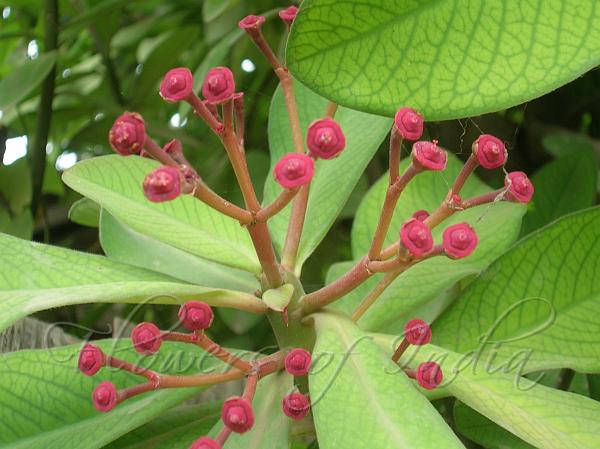|
| African Milk Bush |
|

|

| File size | 968025 |
| Original date | 11/4/08 11:58 AM |
| Resolution | 2048 x 1536 |
| Flash | Flash did not fire, auto |
| Focal length | 10.5mm |
| Exposure time | 1/61s |
| Aperture | 3.7 |
| Focus Distance | |
| Metering Mode | Multi-segment |
| Camera make | NIKON |
| Camera model | E3700 |
| Sensor type |
|
|
|
|
Photo: |
Botanical name: Euphorbia umbellata Family: Euphorbiaceae (Castor family)
Synonyms: Synadenium grantii, Synadenium umbellatum
Synonyms: Synadenium grantii, Synadenium umbellatum
African Milk Bush is a succulent shrub or small
tree native to East Central Africa. In nature, the plants will reach up
to 12 feet in height with an equal spread. The leaves are fleshy,
spirally arranged, crowded towards the ends of stems, 7.5-10cm long and
2.5-4cm wide, dark green above and paler beneath, with a prominent
midrib. Leaves are crowded at the tips of the fleshy green branches,
which gives rise to a light grey bark. The flowers are green to
yellowish-green, mostly concealed by lance-shaped bracts that are
purplish-green above and reddish-purple beneath. The sap is extremely
irritating to the skin, eyes and mouth. Skin contact can cause
blisters. All plants parts are considered very poisonous. This one
should not be grown around small children or animals that like to eat
plants. African Milk Bush is propagated from cutting and from seed.
Medicinal uses: Although toxic and very
caustic to the skin and mucous membranes, the latex has sometimes been
used internally, particularly to deal with internal parasites. Several
drops of latex from warmed leaves are taken to expel intestinal
parasites and sometimes tapeworm. The leaf sap is also used to treat
cardiac problems and excessive menstruation.
A few drops of the latex
is applied topically to warts, the latex is also applied to sores as a
treatment for syphilis. The latex is applied to abscesses in order to
mature them.
Although toxic and very
caustic to the skin and mucous membranes, the latex has sometimes been
used internally, particularly to deal with internal parasites. Several
drops of latex from warmed leaves are taken to expel intestinal
parasites and sometimes tapeworm. The leaf sap is also used to treat
cardiac problems and excessive menstruation.
A few drops of the latex
is applied topically to warts, the latex is also applied to sores as a
treatment for syphilis. The latex is applied to abscesses in order to
mature them.
Medicinal uses:
 Although toxic and very
caustic to the skin and mucous membranes, the latex has sometimes been
used internally, particularly to deal with internal parasites. Several
drops of latex from warmed leaves are taken to expel intestinal
parasites and sometimes tapeworm. The leaf sap is also used to treat
cardiac problems and excessive menstruation.
A few drops of the latex
is applied topically to warts, the latex is also applied to sores as a
treatment for syphilis. The latex is applied to abscesses in order to
mature them.
Although toxic and very
caustic to the skin and mucous membranes, the latex has sometimes been
used internally, particularly to deal with internal parasites. Several
drops of latex from warmed leaves are taken to expel intestinal
parasites and sometimes tapeworm. The leaf sap is also used to treat
cardiac problems and excessive menstruation.
A few drops of the latex
is applied topically to warts, the latex is also applied to sores as a
treatment for syphilis. The latex is applied to abscesses in order to
mature them. | Identification credit: Tony from Sydney | Photographed in Manipur & Maharashtra. |
• Is this flower misidentified? If yes,